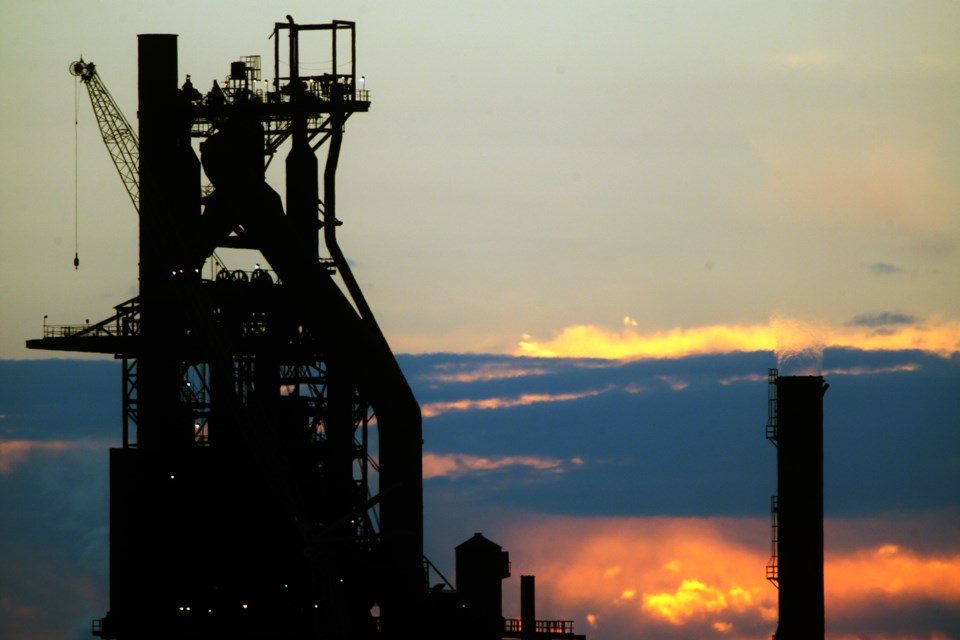SAULT STE. MARIE — Algoma Steel's cornerstone business asset, its direct strip production complex, was hobbled recently by a COVID outbreak that coughed millions of dollars from the steelmaker's bottom line.
Algoma's renowned DSPC turns liquid steel into finished coil in minutes.
But ravaged by coronavirus, the company had trouble during the past quarter finding enough staff to operate the pride and joy of local steelmaking.
"Our community was not immune to the impacts of COVID," says Michael Garcia, president and chief executive officer.
"During the quarter we experienced a concentrated outbreak, which impacted the DSPC," Garcia told investors during an earnings call last week.
"We're implementing various measures to address labor availability, including cross-training more employees to better handle that absenteeism event."
The COVID outbreak was just one part of a triple whammy of production gremlins that wounded Algoma during the three-month period ended Sept. 30.
The others, previously reported by SooToday, were software problems encountered during a $120 million plate mill modernization and an August fire at one of the company's two coal conveyors.
"Fortunately no one was injured," Garcia said regarding the fire.
"All repairs are complete, and we are operating the coke ovens to capacity. The fire negatively impacted our ability to produce coke internally during the quarter, forcing us to buy third-party product which unfavorably impacted cost and profitability."
"As we faced those operational challenges, we also had to deal with what has been a volatile overall market for steel and for raw material inputs, which impacted realized prices and costs," Garcia said.
Rajat Marwah, Algoma's chief financial officer, said the triumvirate of production woes cost the company a total of $130 million, of which 60 per cent fell during the most recent quarter.
"The remaining 40 per cent is expected to impact fiscal third quarter results due to the flow through of higher production costs into inventory," he said.
Marwah attributed about 50 per cent ($65 million) of the $130 million drag on the plate mill commissioning problems, 30 per cent to the coke oven fire ($39 million) and 20 per cent ($26 million) to the COVID outbreak at the steel mill.
"Our performance in the fiscal second quarter was not up to the standards we strive to achieve at Algoma," said Garcia.
"Specifically, we are addressing the operational challenges themselves so we can return to full operating capacity."
"We are focused on putting the operational challenges we have faced behind us, to ensure safe, reliable efficient production at our existing facilities while we advance the electric arc furnace project," Garcia said.
Meanwhile, Algoma Steel issued the following update confirming it's not yet off the hook for possible regulatory fines or other legal actions related to an oil spill into the St. Marys River in June:
On June 9, 2022, the company experienced an incident where an oil-based lubricant was released from our hot mill in Sault Ste. Marie.
The oil entered our water treatment facility, and some quantity of the oil was discharged into the St. Marys River.
Following the discharge, traffic on the river was temporarily halted, the local public health authority issued a water advisory and a nearby municipality issued an emergency declaration regarding its municipal water supply.
We actively worked with our response partners deploying equipment and resources to contain and mitigate the effects on the waterway and neighbouring communities and are working with local, provincial, and federal regulatory authorities.
The public health authorities lifted the water advisory on June 21, 2022 and the U.S. Coast Guard did not see any impact to shoreline or marine wildlife.
At present, the company has not received any orders or offenses from any regulatory authority. We may be subject to regulatory fines and other public and private actions in the future as a result of the incident but the financial and other impact of this incident is currently unknown.
